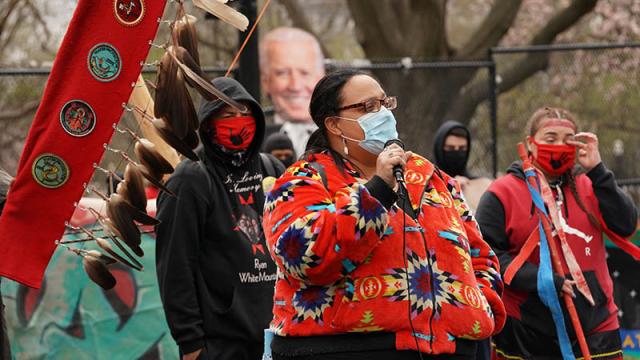
An indigenous woman speaks at the White House in early April about the need to shut down the Dakota Access Pipeline. The U.S. Army Corps of Engineers said April 9 it would allow the crude oil pipeline to remain open during its review. (Source: Phil Pasquini/Shutterstock.com)
The U.S. Army Corps of Engineers on April 9 said it will allow Energy Transfer’s Dakota Access oil pipeline to keep running, after an environmental permit was scrapped last year, a blow to activists who wanted to see the line shut.
The move leaves the decision on shutting down the pipeline with the U.S. District Court of the District of Columbia. Native American tribes who have opposed the line for years have asked a judge to shut the line as the Corps does an environmental review.
The Dakota Access Pipeline (DAPL) ships up to 570,000 barrels of North Dakota’s crude production to the U.S. Midwest and Gulf Coast. It is the largest pipeline out of the Bakken region, where more than 1 million barrels of oil are produced daily.
The Corps said it will likely have a decision on its latest review by March 2022, said Ben Schifman, an attorney representing the Corps. He said the Corps is still doing its environmental review but did not plan on taking enforcement actions.
U.S. District Judge James Boasberg and attorneys for the Native American tribes expressed surprise that the Corps was not going to decide on whether to shut the line.
“It’s the continuation of a terrible history that we believed was going to change,” Earthjustice lawyer Jan Hasselman, who represents the Standing Rock Sioux, told the court. “So we are really disappointed to hear this news from the Army Corps.”
The Biden Administration is trying to boost use of renewable fuels as part of a transition to a lower-carbon economy. It canceled a presidential permit for the unbuilt Keystone XL pipeline from Canada but has of yet not elected to shut an operating pipeline like DAPL.
The pipeline drew fierce opposition from climate activists and Native American tribes, with months of protests. Eventually, the Trump administration authorized a key permit to complete construction and the pipeline entered service in 2017.
Last summer, the U.S. District Court for the District of Columbia threw out that permit, which allowed it to operate under a water source used by Native American tribes.
The Standing Rock Sioux and environmental groups say the pipeline threatens a drinking water supply and should not continue to run, and they have ramped up pressure on the White House to shut the line.
Recommended Reading
SLB’s ChampionX Acquisition Key to Production Recovery Market
2024-04-19 - During a quarterly earnings call, SLB CEO Olivier Le Peuch highlighted the production recovery market as a key part of the company’s growth strategy.
PHX Minerals’ Borrowing Base Reaffirmed
2024-04-19 - PHX Minerals said the company’s credit facility was extended through Sept. 1, 2028.
BP Restructures, Reduces Executive Team to 10
2024-04-18 - BP said the organizational changes will reduce duplication and reporting line complexity.
Matador Resources Announces Quarterly Cash Dividend
2024-04-18 - Matador Resources’ dividend is payable on June 7 to shareholders of record by May 17.
EQT Declares Quarterly Dividend
2024-04-18 - EQT Corp.’s dividend is payable June 1 to shareholders of record by May 8.





